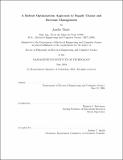A robust optimization approach to supply chains and revenue management
Author(s)
Thiele, Aurélie, 1977-
DownloadFull printable version (1.111Mb)
Other Contributors
Massachusetts Institute of Technology. Dept. of Electrical Engineering and Computer Science.
Advisor
Dimitris J. Bertsimas.
Terms of use
Metadata
Show full item recordAbstract
The contribution of this thesis is to provide a tractable framework for supply chains and revenue management problems subject to uncertainty that gives insight into the structure of the optimal policy and requires little knowledge of the underlying probability distributions. Instead, we build upon recent advances in the field of robust optimization to develop models of uncertainty that make few probabilistic assumptions and have an adjustable level of conservatism to ensure performance. Specifically, we consider two classes of robust optimization approaches. First, we model the random variables as uncertain parameters belonging to a polyhedral uncertainty set, and optimize the system against the worst-case value of the uncertainty in the set. The polyhedron is affected by budgets of uncertainty, which reflect a trade-off between robustness and optimality. We apply this framework to supply chain management, show that the robust problem is equivalent to a deterministic problem with modified parameters, and derive the main properties of the optimal policy. We also explore a second approach, which builds directly on the historical realizations of uncertainty, without requiring any estimation. In that model, a fraction of the best cases are removed to ensure robustness, and the system is optimized over the sample average of the remaining data. This leads to tractable mathematical programming problems. We apply this framework to revenue management problems, and show that in many cases, the optimal policy simply involves an appropriate ranking of the historical data. Robust optimization emerges as a promising methodology to address a wide range of management problems subject to uncertainty, in particular in a dynamic setting, as it leads to (cont.) representations of randomness that make few assumptions on the underlying probabilities, remain numerically tractable, incorporate the decision-maker's risk aversion, and provides theoretical insights into the structure of the optimal policy.
Description
Thesis (Ph. D.)--Massachusetts Institute of Technology, Dept. of Electrical Engineering and Computer Science, 2004. Includes bibliographical references (p. 171-176). This electronic version was submitted by the student author. The certified thesis is available in the Institute Archives and Special Collections.
Date issued
2004Department
Massachusetts Institute of Technology. Department of Electrical Engineering and Computer SciencePublisher
Massachusetts Institute of Technology
Keywords
Electrical Engineering and Computer Science.